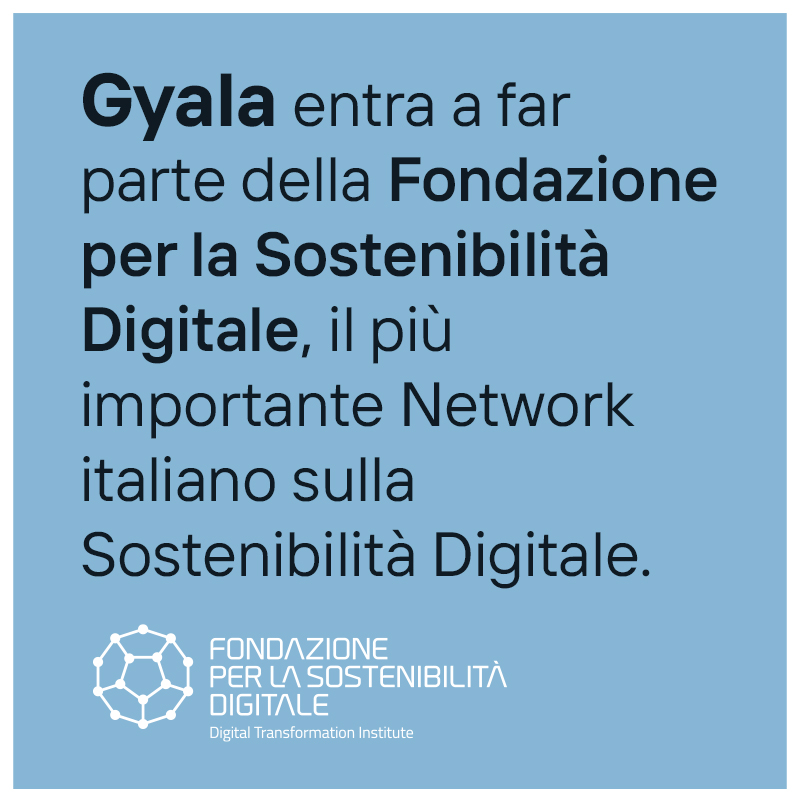Gyala Joins the Foundation for Digital Sustainability

A new partner joins Italy’s leading Digital Sustainability Network
PRESS RELEASE
Rome, April 14, 2025 – The Foundation for Digital Sustainability, Italy’s first officially recognized research foundation focused on digital sustainability, today announced that Gyala has joined its network, which already includes 19 Italian universities and leading national and international companies across various industries.
“We are very pleased that Gyala has joined the Foundation,” said Stefano Epifani, President of the Foundation for Digital Sustainability.. “Becoming a Partner of the Foundation means joining the most important and qualified Italian network focused on Digital Sustainability. Each partner actively participates in research initiatives and gains priority access to data and results; they may also sponsor conferences and seminars, promote training and awareness campaigns, and benefit from privileged access to all the Foundation’s services,” Epifani continued.
“We are truly excited to be part of this ambitious project, confident that the combination of diverse experiences and knowledge will bring significant value to our organization. In return, we hope to contribute to shaping a sustainable path—also through cybersecurity,” commented Carmine Caretta, CFO and HR Manager at Gyala.
The Foundation is composed of independent experts, institutions, companies, and universities, whose representatives form the advisory and scientific committees. Alongside the Foundation’s public and private partners, a network of universities provides the core competencies that drive project development—serving as a best-practice example of collaboration between institutions and the private sector.
The Foundation is inspired by and adheres to the Manifesto for Digital Sustainability, a vision outlining the role of technology in shaping a sustainable future. It defines the principles that should guide technological development to ensure that today’s needs are met without compromising the ability of future generations to meet their own.
“Through research, communication, training, and advocacy initiatives, the Foundation aims to contribute to the objectives of the 2030 Agenda for Sustainable Development—promoting technology as a tool in service of sustainability. It seeks to foster a structured dialogue on how digitalization must be pursued according to sustainability criteria, including the role of digital platforms and their related economic and social dynamics, thus making technology itself a subject of sustainability,” Epifani concluded.
The full list of member organizations and universities currently part of the Foundation is available at the following link
👉 www.sostenibilitadigitale.it
About the Foundation for Digital Sustainability:
The Foundation for Digital Sustainability is Italy’s first research foundation dedicated to analyzing the relationship between digital transformation and sustainability, with the goal of supporting institutions and businesses in building a better future. Its mission is to study the dynamics triggered by digital transformation—especially in relation to environmental, cultural, social, and economic sustainability. To this end, the Foundation conducts research, offers insights and interpretations of digital change, provides practical guidance for stakeholders, identifies trends, and evaluates their impact on sustainable development. Its structure includes independent experts, institutions, companies, and universities. The University Network, which supports the Foundation’s activities, serves as its core knowledge base and exemplifies effective collaboration between academia and industry in developing digital sustainability initiatives.
Some of the universities in the Network include: Sapienza University of Rome, University of Pavia, Ca’ Foscari University of Venice, University of Cagliari, University of Palermo, University of Florence, University of Trieste, University of Perugia, University for Foreigners of Perugia, University of Siena, University of Urbino Carlo Bo, University of Turin, Istituto di Studi Politici “S. Pio V”, University of Sassari, University of Padua VSIX, University of Salento, University of Tuscia, and the Alma Mater Studiorum – University of Bologna.